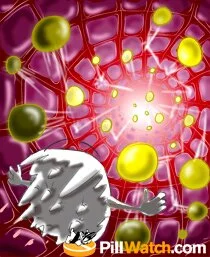
Every asthma sufferer is at risk of experiencing an attack of the disease if he or she is exposed to certain things – triggers – which affect airways in the lungs. Here may belong a wide variety of different things, for example, dust mites, pollen, fungi, etc. Every person reacts to different stuff, so the triggers vary greatly in different asthma sufferers.
If a person inhales the substances, which turn out to be the triggers of his asthma attack, his body responses by releasing leukotrienes and other chemicals. They provoke swelling of the airways in the lungs, which, as a result, become too narrow to provide normal breathing. This is how asthma attack occurs. It manifests itself through the shortness of breath, coughing, wheezing, and so on.
Nowadays there exist medications, which help control asthma attacks and prevent them before they actually begin. Such drugs are called “asthma controller medicines”. One of the popular and often prescribed medications of the kind is Singulair, approved by the American FDA for asthma control in 1998.
Singulair pills work by blocking leukotrienes – the main reason of airways swelling. Drug’s active ingredient is montelukast sodium, which is a leukotriene receptor antagonist, capable of binding to leukotriene D4, thus blocking its action and lessening inflammation.
Singulair is not made for the treatment of acute asthma attacks. In this case, a patient should use fast-acting asthma inhalers. Singulair, on the other hand, should be used on a daily basis irrespective of the presence of asthma symptoms.
The use of the drug is said to ensure the reduction of the frequency of the disease attacks, as well as lessening their severity and duration. The effectiveness of the drug is seen if a patient experiences fewer asthma symptoms during the day-time, awakens less often due to the disease signs at night, needs to use his/her asthma inhaler less often and, in general, has fewer asthma attacks.
It should be noted that the pills come in several forms: 10 mg. tablets, 5 mg. chewable tablets, 4 mg. chewable tablets, and 4 mg. packets with oral granules. The variety of forms was developed in order for the patients of different age groups to be able to use the most comfortable drug formulation; namely, babies 12 months and older can be treated with Singulair granules, kids 2-5 years old can take 4 mg. chewable pills, children 6-15 years old are given 5 mg. chewable tablets.
Health care providers note that the drug is usually well tolerated by children. However, adverse reactions do occur in some patients. The most common Singulair side effects are headache, flu-like symptoms, tiredness, gastrointestinal problems, sleep patterns changes, and dizziness. Many people experience allergic reactions, others report of restlessness, irritability, and hallucinations.
Singulair overdose is a very rare thing and is not likely to happen if a patient sticks to the dose recommendations. Overdose symptoms include tiredness, thirst, abdominal pain, excessive movement, and dilation of the pupils of the eyes.

It is known that Phenobarbital and rifampin decrease Singulair effectiveness, so such drug combination should be avoided. As for the foods, there are no special restrictions; montelukast can be taken with or without food. For asthma control it should be used once daily in the evening.
Although Singulair is believed not to harm an unborn baby, a woman should anyway inform her doctor that she is or intends to become pregnant. Patients with cirrhosis of the liver and people older than 55 may need dose adjustments of Singulair.
The most important fact the users of this medicine should always keep in mind is that Singulair will not work for the elimination of acute asthma attack symptoms. Its obvious advantage, however, is the drug’s safety.
| Tip for you : Sign-in with Your OpenID and post faster, easier and with easy access to all your past posts. | |
|
Your Nick: |
















